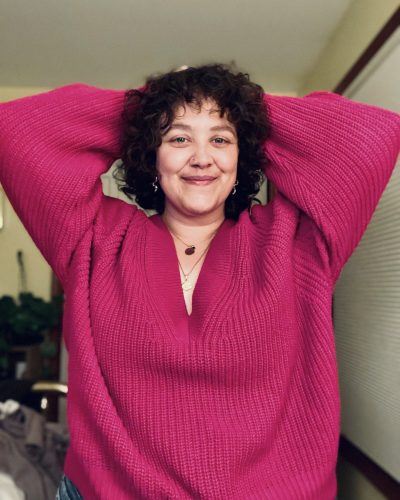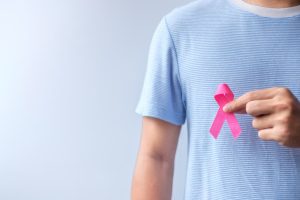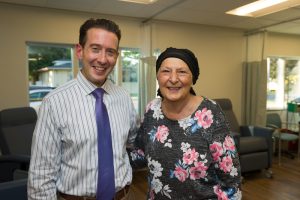
Early Signs of Inflammatory Breast Cancer
Regional Cancer Care Associates (RCCA) provides comprehensive treatment of cancer and blood disorders to patients throughout New Jersey, Connecticut, Maryland, and the Washington, DC, area.
HIPAA Alert: Potential Data Breach Learn More
Questions on Oncology, Hematology and/or Infusion Clinical Services due to COVID-19 Crisis – CALL 833-698-1623
Important Information for Our Patients Regarding the Coronavirus.
RCCA Providing Area Cancer Patients with Access to Care During Coronavirus Outbreak
RCCA Offering Patients Virtual Visits During Coronavirus Pandemic
Sarah Van Syckel spent her 32nd birthday in a way no one should have to spend any day: having a biopsy to determine whether she had cancer.
Three days later, Ms. Van Syckel received the biopsy results and learned that she was among the roughly 11,870 American women younger than age 40 diagnosed with invasive breast cancer each year.1
A subsequent meeting with a breast surgeon provided more information – and a great deal more to consider. Ms. Van Syckel had Stage 1, Grade 3 invasive ductal carcinoma that was human epidermal growth factor receptor 2 (HER2) positive. The Stage 1 designation signified that the cancer was in its early phases. However, the Grade 3 classification meant that the cancer was relatively fast growing, and HER2-positive breast cancers tend to be more aggressive than other types of the disease.
There also was the matter of family history. Ms. Van Syckel’s mother and an aunt on her mother’s side had been diagnosed with breast cancer, while an aunt on her father’s side had died of the disease. Further, her father had died of lung cancer when she was four years old. Genetic testing revealed that while Ms. Van Syckel did not have one of the BRCA genetic mutations that drive many cases of hereditary breast cancer, she had another mutation – in the ATM gene – that also is associated with breast cancer.
THE FERTILITY FACTOR
And if all that wasn’t enough to deal with, Ms. Van Syckel – who had always wanted children – had to think about fertility preservation because some of the treatments she might be receiving could affect her ability to conceive.

Facing several major decisions, Ms. Van Syckel consulted two medical oncologists at different practices. She was impressed with both, but felt particularly comfortable with one of them, May Abdo-Matkiwsky, DO. “I had heard amazing things about Dr. May, who my mother had seen for a second opinion for her own treatment some years before. When I met with her, she was just so thorough. She made me feel like I was her only patient that day,” the Sussex County, NJ resident says of Dr. Abdo-Matkiwsky, who practices at the Sparta, NJ offices of Regional Cancer Care Associates, or RCCA, one of the nation’s largest networks of oncology specialists.
The treatment plan Dr. Abdo-Matkiwsky recommended called for chemotherapy followed by surgery. Because of the ATM genetic mutation, Ms. Van Syckel decided that after completing chemotherapy she would undergo a double mastectomy, rather than a unilateral mastectomy or some type of breast-conserving surgery. First, however, there was the matter of having a fertility specialist extract eggs from her ovaries and cryopreserve them so that she could pursue pregnancy later on.
“I met with a fertility doctor, who explained what the procedure involved and outlined the costs. Many insurance plans, including the one I had, don’t cover egg retrieval and preservation in these circumstances, and I couldn’t afford the out-of-pocket costs. Fortunately, a nurse told me about Chick Mission.”
Ms. Van Syckel explains that Chick Mission is a non-profit group that operates a grant program to help women with cancer pay for fertility-preservation procedures. The group also advocates for state laws that would require insurers to cover these procedures for people dealing with cancer. While the fertility specialist she consulted originally did not work with The Chick Mission, the non-profit group put her in touch with another reproductive endocrinology practice, IRMS Institute for Reproductive Medicine, where the office staff processed all the required paperwork for her Chick Mission grant in two days.
Ms. Van Syckel began her chemotherapy regimen on July 2, 2019, soon after a fertility specialist had performed oocyte retrieval. The treatment involved four rounds of combination therapy with the drugs doxorubicin hydrochloride and cyclophosphamide, followed by 12 rounds of paclitaxel. Along with those chemotherapy agents, Ms. Van Syckel received injections of a drug called pegfilgrastim, which is given to stimulate the growth of white blood cells and so reduce the risk of infection in people receiving chemotherapy. Unfortunately, the drug – which acts in the bone marrow where blood cells develop – can cause bone pain, which Ms. Van Syckel experienced along with the fatigue and other side effects of chemotherapy.
After completing her chemotherapy in November 2019, Ms. Van Syckel had a double mastectomy on December 17, 2019. Then, as she was recovering from the procedure, COVID-19 arrived in the United States, and the world as she knew it — and was waiting to return to – shut down around her. A writer and poet, Ms. Van Syckel used that time to blog about her experience, as she also did periodically throughout her treatment.
THREE PIECES OF ADVICE FROM A YOUNG SURVIVOR
In an interview almost three years after her diagnosis, Ms. Van Syckel shared three pieces of advice. “The main thing I would tell someone just diagnosed with breast cancer, or with any cancer or serious medical condition, is to advocate for yourself. It’s so important to ask questions, and to do the research,” she says.
For Ms. Van Syckel, that advocacy began with performing regular self-breast exams, which led to her finding a lump; seeing her Ob/Gyn, who also felt the lump; and then having a mammogram and breast ultrasound, followed by the biopsy which confirmed the cancer.
Her oncologist, Dr. Abdo-Matkiwsky, says, “Some years ago, the American Cancer Society recommended against women performing self-exams, and against physicians performing clinical breast exams on women at average risk for breast cancer. While I have the greatest respect for the American Cancer Society and the wonderful work it does in so many areas, I respectfully disagree with this recommendation. Over the years, I have treated many, many women whose breast cancer was detected through self-examination or a clinician’s examination, and these exams have resulted in early diagnosis, early treatment, and – as a result – better outcomes. In terms of being vigilant about her self exams, in seeking different medical opinions and thoughtfully considering her options, and so much else, Sarah epitomizes the proactive, engaged patient who truly takes charge of her health and life.”
Ms. Van Syckel’s second piece of advice: “Don’t be afraid to ask for help,” including from the people in your life and the healthcare professionals working to protect your life. “In many cases, the people around you won’t know what to say or do, and they will say the wrong thing. That can be annoying at times, but you need to remember that they’re trying,” she says.
In terms of the physicians, nurses, and others on your healthcare team, Ms. Van Syckel emphasizes that it’s important to talk with them not only about physical symptoms but also about things like depression and anxiety, which may emerge or be intensified with a cancer diagnosis.
The third recommendation Ms. Van Syckel offers is that, “Community is really important; find people who get it.” In Ms. Van Syckel’s case, that search for community included becoming involved with The Breasties, a non-profit group dedicated to supporting those affected by breast and reproductive cancers. “You never want to join the cancer community, but I’ve connected with some pretty cool women out there who have been a light both during treatment and on the other side. Cancer never goes away, even when you’re ‘cancer free’, and it’s nice to have people in my life who understand on a deep level,” she says.
With her chemotherapy and mastectomy long behind her, Ms. Van Syckel is on a 5-year course of tamoxifen to reduce the risk of a cancer recurrence, although she is heartened by the fact that her surgery yielded “clean margins,” indicating that it had removed all of the cancerous cells.
She also continues to see Dr. Abdo-Matkiwsky every three months. “Dr. May is incredible, kind, and so encouraging; I always feel like a million bucks when I leave her office,” Ms. Van Syckel says, adding, “She’s such a good human, on top of being a brilliant doctor, and I would trust her with my life every time.”
****
Dr. Abdo-Matkiwsky has treated patients in Sussex County and surrounding communities for more than 15 years. After earning her medical degree from the New York College of Osteopathic Medicine, she completed a residency in internal medicine at the University of Medicine and Dentistry of New Jersey, and a fellowship in medical oncology and hematology at Beth Israel Medical Center in New York City. Dr. Abdo-Matkiwsky is board-certified in internal medicine and medical oncology, and has served as an adjunct professor in hematology/oncology at Touro College of Osteopathic Medicine for the last five years. She directs the Tumor Board at Newton Medical Center and is actively involved in breast cancer research, enrolling patients in multiple clinical trials. A member of the American Society of Clinical Oncology and American Society of Hematology, Dr. Abdo-Matkiwsky has received numerous honors and awards, as well as being included in numerous annual editions of Jersey’s Best magazine Top Doctors issue. She also participates in several fund-raising events for community organizations and the public school system.
Dr. Abdo-Matkiwsky is among the 90+ cancer specialists who treat patients at 25 RCCA care centers located throughout New Jersey, Connecticut, Maryland, and the Washington, DC, area. RCCA oncologists and hematologists see more than 23,000 new patients each year and provide care to more than 225,000 established patients, collaborating closely with their patients’ other physicians. They offer patients the latest in cutting-edge treatments, including immunotherapies and targeted therapy, as well as access to a wide range of clinical trials. In addition to serving patients who have solid tumors, blood-based cancers, and benign blood disorders such as anemia, RCCA care centers also provide infusion services to people with a number of non-oncologic conditions—including multiple sclerosis, Crohn’s disease, asthma, and rheumatoid arthritis—who take intravenously-administered medications.
To learn more about RCCA, call 1-844-346-7222 or visit RCCA.com.
References:
For more information or to schedule an appointment,
call 844-346-7222. You can also schedule an appointment by calling the RCCA location nearest you.

Regional Cancer Care Associates (RCCA) provides comprehensive treatment of cancer and blood disorders to patients throughout New Jersey, Connecticut, Maryland, and the Washington, DC, area.

When people think of breast cancer, they generally think of it affecting women. However, in rare circumstances, breast cancer can affect men, most commonly in

First diagnosed with breast cancer in 1992, she has persevered in her battle against the disease for more than 30 years.

Regional Cancer Care Associates is one of fewer than 200 medical practices in the country selected to participate in the Oncology Care Model (OCM); a recent Medicare initiative aimed at improving care coordination and access to and quality of care for Medicare beneficiaries undergoing chemotherapy treatment.